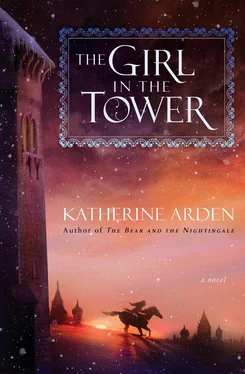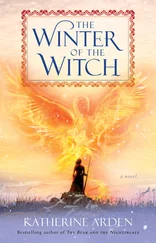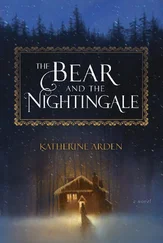Vasya stumbled down the stairs, bleeding, dragging the child, who ran in her wake, speechless again and tearless.
The stairway was full of choking smoke. Marya began to cough. There were people on the stairs now: servants. The phantoms were gone. Vasya heard the shrieks of women up above, as though Kasyan had never been there: a young sorcerer with flame in his fist, or an old man, screaming.
They emerged into the dooryard. The gates were smashed; the yard full of people. Some lay unmoving in the bloodied and trampled snow. A few gasped, whimpered, called out. No more arrows flew. Chelubey was nowhere in sight. Dmitrii was calling orders, his face a mask of bloody soot. Most of the horses had been haltered and were being led hastily out through the gate—away from the fire. How near was it? What house had finally succumbed to the falling sparks? The barn-fire in the dooryard was dying down; Dmitrii’s army of servants must have been able to contain it. But Vasya could hear the whispering roar of a greater fire, and she knew they were not safe yet. The wind must be behind the flames, for her to taste the smoke. It was coming. It was coming, and it was her fault.
Sasha was still riding Solovey, she saw with relief. Her brother was speaking to a man on the ground.
Marya gave a cry of fear. Vasya turned her head.
The demon of midnight: moon-haired, star-eyed, night-skinned, had appeared on the stairs, as though born of the space between flames. No horse; just herself. The red light shone purple on the chyert’s cheek. Something like sorrow put out the starlight in her gaze. “Are they dead?” she asked.
Vasya was still stunned from the fight in the tower. “Who?”
“Tamara,” hissed the chyert impatiently. “Tamara and Kasyan. Are they dead?”
Vasya gathered her wits. “I—yes. Yes. How—?”
But Midnight only said wearily, over the roar, almost to herself, “Her mother will be glad.”
Vasya, much later, would wish she had grasped the significance of this. But at the moment she did not. She was bruised, shocked, and exhausted; Moscow was burning down around them and it was her fault. “They are dead,” she said. “But now the city is on fire. How can Moscow be saved?”
“I am witness to all the world’s midnights,” returned Midnight wearily. “I do not interfere.”
Vasya seized Midnight’s arm. “Interfere.”
The midnight-demon looked taken aback; she pulled, but Vasya hung on grimly, smearing the creature with her blood. She was strong with mortality—and something more. Midnight could not break her grip. “My blood can make your kind strong,” said Vasya coldly. “Perhaps, if I will it, my blood can also make you weak. Shall I try it?”
“There is no way,” breathed Midnight, looking a little uneasy now. “None.”
Vasya shook the chyert so her teeth rattled. “There must be a way!” she cried.
“That is”—Midnight gasped—“long ago, the winter-king might have quieted the flames. He is master of wind and snow.” The glossy eyelids veiled the shining eyes, and her glance turned malicious. “But you were a brave girl and drove Morozko off, broke his power in your hands.”
Vasya’s grip loosened. “Broke—?”
Polunochnitsa half-smiled, teeth gleaming red in the firelight. “Broke,” she said. “As you said, wise girl, your power works two ways.”
Vasya was silent. Midnight bent forward and whispered, “Shall I tell you a secret? With that sapphire, he bound your strength to him—but the magic did what he did not intend; it made him strong but it also pulled him closer and closer to mortality, so that he was hungry for life, more than a man and less than a demon.” Polunochnitsa paused, watching Vasya, and murmured, cruelly, “So that he loved you, and did not know what to do.”
“He is the winter-king; he cannot love.”
“Certainly not, now,” said Polunochnitsa. “For his power broke in your hands, as I said, and by your words, you banished him. Now he will only be seen in Moscow by the dying. So get out of the city, Vasilisa Petrovna; leave it to its fate. You can do nothing more.”
Midnight gave one final, furious wrench and tore herself from Vasya’s grip. In an instant, she was lost to sight in the pall of smoke that veiled the city.
* * *
NEXT MOMENT, VASYA HEARD Solovey’s ringing neigh, and then Sasha came splashing off the horse’s back into the half-melted snow. Her brother pulled both her and Marya into a tight embrace and Solovey snuffled gladly over all of them. Sasha smelled of blood and soot. Vasya hugged her brother, stroked Solovey’s nose, and then drew away, swaying on her feet. If she allowed herself weakness now, she knew she would never gather her strength again in time, and she was thinking furiously…
Sasha picked up Marya, set her on Solovey’s back, and turned back to Vasya.
“Little sister,” said Sasha. “We must go. Moscow is burning.”
Dmitrii came galloping up. He looked down at Vasya an instant, her long plait, her bruised face. Something chilled and darkened in his face. But all he said was, “Get them out, Sasha. There is no time.”
Vasya made no move to get onto Solovey’s back. “Olya?” she asked her brother.
“I will go find her,” said Sasha. “You must get on Solovey. Ride out of the city with Marya. There is no time. The fire is coming.”
Over the bustle in the Grand Prince’s dooryard, beyond his walls, Vasya heard the thick cries of people in the city as they gathered what they could and fled.
“Get her up,” said Dmitrii. “Get them out.” He rode off, calling more orders.
Into the shadows, Vasya whispered, “Can you hear me, Morozko?”
Silence.
Outside Dmitrii’s walls, the wind wrapped like a river around the city, whipping the flames higher. She remembered Morozko’s voice. Only if you are dying, he had said. Nothing could keep me from you then. I am Death, and I come to all when they die.
Before Vasya could think twice; before she could talk herself out of it, she pulled off her own cloak, reached up, and cast it around Marya’s drooping shoulders.
“Vasya,” said her brother. “Vasya, what are you—?”
She didn’t hear the rest. “Solovey,” she said to the horse. “Keep them safe.”
The horse bowed his great head. Let me go with you, Vasya, he said, but she only laid a cheek against his nose.
Then she was running out the ruined gate, and toward the burning.
* * *
THE STREETS WERE CHOKED with people, most of them going the opposite way. But Vasya was light in the snow, unencumbered with a cloak, and running downhill. She moved quickly.
Twice someone tried to tell her she was going in the wrong direction, and once a man seized her by the arm and tried to shout sense into her ear.
She wrenched herself loose and ran on.
The smoke thickened. The people in the streets grew more panicked. The fire loomed over them; it seemed to fill the world.
Vasya began to cough. Her head swam, her throat swelled. Her mouth was dust-dry. There, finally, was Olga’s palace, above her in the red darkness. Fire raged—one street beyond? Two? She couldn’t tell. Olga’s gates were open, and someone was shouting orders within. A stream of people poured out. Had her sister been carried away already? She breathed a prayer for Olga, then ran on past the palace, into the inferno.
Smoke. She breathed it in. It was her whole world. The streets were empty now. The heat was unbearable. She tried to run on, but found she had fallen to her knees, coughing. She couldn’t get enough air. Get up. She staggered on. Her face was blistering. What was she doing? Her ribs hurt.
Читать дальше












